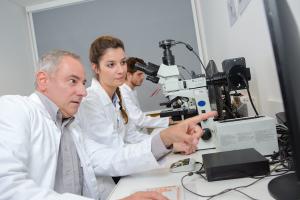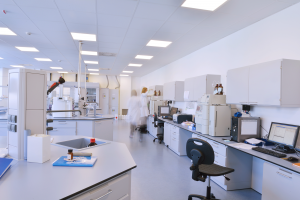10 Skills You Need to Become a Successful Lab Manager
Are you a current lab manager or looking to become one? Read some of our tips on how to be successful in your career!
In larger organizations, the lab manager may have to interface with dedicated purchasing staff members”
AUSTIN, TEXAS, UNITED STATES, July 26, 2018 /EINPresswire.com/ -- As a provider of unique furniture solutions to laboratory facilities at major Fortune 500 companies for over 35 years, Formaspace has developed unique insights into the best practices used in today’s modern lab facilities. One key observation is the increasingly important (and diverse) role of laboratory managers.— Formaspace
Over the past 35 years that Formaspace has been working directly with Lab Managers, we’ve seen a lot of changes in the industry. Indeed, today’s lab managers wear multiple hats that require them to develop a broad set of effective management skills — ranging from chief problem solver to team facilitator.
If you are contemplating a career move into laboratory management or know someone that is, we’ve compiled a list of the top 10 effective management skills that every laboratory manager should master.
Let’s get started:
1. Laboratory Managers Need to Be Good Business and Project Managers
Overview: Don’t get us wrong. We’re not saying scientific research has to be all business (some of the best discoveries have been made in unorthodox ways). Instead, we’re saying that the role of laboratory management is to provide services to the investigators in a reliable businesslike manner, in order to provide seamless support for scientific research (or related services functions, such as in the case of IT labs).
Scope of Activities: Establish a vision and mission with both detailed short-term plans as well as long-term plans (5+ years out) that track progress on specific project goals, time management, and budgetary issues, such as income sources, spending, salaries.
Recommendations: Lab Managers overseeing large laboratory settings (in universities, government or healthcare / pharma) might benefit from business classes or an MBA in order to manage complex budgets and other requirements. Certification from PMI as a Project Management Professional (PMP) could also be helpful. Countless books, seminars, and online classes teach business management skills. If you are new to all this, then The One Minute Manager and Putting First Things First are two resources to look into.
2. Laboratory Management Typically Oversees Acquisition of Capital Equipment, Purchasing of Supplies and Services, and Inventory Control
Overview: In a small laboratory environment, much of this work will fall directly on the lab manager, who may be directly responsible for allocating budgetary funds (from a research grant for example). In larger organizations, the lab manager may have to interface with dedicated purchasing staff members. In either case, it’s important to adhere to rigorous government* policies that regulate service contracts as well as asset acquisition, use, and disposition activities.
(*Government contracts may require sourcing from vendors, like Formaspace, that are listed on GSA purchasing schedules.)
Scope of Activities: Set spending priorities during each budgetary cycle; identify requirements for capital equipment; investigate vendor options; ensure timely ordering procedures for consumable supplies (including bidding out if required); establish service contracts (such as for disposing of hazardous wastes); negotiate with the company or institution hosting the lab over assigned overhead costs to be borne by your budget; set up inventory tracking and control system as well as establish procedures to protect valuable or potentially dangerous assets from misuse or theft.
Recommendations: In addition to the recommendations for business and project management, new laboratory managers might look into taking classes in purchasing management. If you are working with the government or military, look for online seminars and guides (from the GAO, GSA, etc.). Establishing friendly contacts with the purchasing department of your company or institution early on is also a good idea (rather than waiting until there is a confrontational issue at hand). Ideally, you will be able to find a mentor who can help you understand the ins and outs of rules and procedures already in use at your institution or company.
3. Laboratory Managers Need to Develop Effective Management Skills in Public Relations and Internal Communications
Overview: Do you wonder why some laboratories always seem to be promoted in the news, or they have widespread support throughout the entire organization? Conversely, have you witnessed reports of laboratory errors or accidents that made the news and put the lab in the worst possible light? These are just two examples of how good (and bad) public relations and internal communications programs can affect your laboratory workplace.
Scope of Activities: Public Relations generally refers to a wide range of communication programs directed outside the organization (from community relations, to press coverage, to trade fairs), while internal communications programs are directed at internal audiences (to educate and promote positive awareness of your activities). Depending on the size of your organization, you may need to liaise with existing communications teams (or external agencies), or you may need to develop these resources yourself.
Recommendations: Generally speaking, having a robust external and internal communications program (assuming your work is not classified or a trade secret) will help win over support for activities taking place in your lab (which can be very useful at budget allocation negotiations). Working with your existing communications team (if any), you should consider hosting press events, public tours (if appropriate), provide useful press releases and social media postings to gain local (if not national) coverage. Consider providing media training to lab researchers (such as lead investigators) to improve their ability to communicate in language that targeted audiences can understand — using video recordings for feedback sessions can be very useful. Practice in advance how you would respond to a crisis (such as an accident or another adverse incident) by conducting realistic dry runs on how to communication with the press during that time. Make sure you know the private cell numbers of key administration staff who will need to be looped in at short notice.
4. Laboratory Management is Often in Charge of Education and Staff Development Programs for the Lab Team
Overview: Face-to-face meetings at scientific conferences, scientific journal subscriptions, and training classes are a few examples of education and staff development programs that will help lab team members grow in their field while improving morale at the same time.
Scope of Activities: Participation in most education and development programs (such as conferences and training classes) should be planned far in advance. Managers will need to identify and prioritize which activities and purchases will provide the most benefit for the lab — as well as make judicious choices for who will participate. Associated costs — ranging from time away from the lab to subscriptions, tuition, admission and travel expenses — will need to be budgeted for in advance.
Recommendations: Joining the relevant scientific or trade associations that govern your lab’s area of interest is a good place to start. Don’t overlook participation in standards committees or governing boards (if relevant) if you are looking for ways for your team members to network or raise your organization’s profile. Identifying mentors who can provide guidance to lab team members is another good approach. If travel expenses are an issue, but you have good facilities for hosting guests at your company or institution, consider creating your own event to bring relevant experts to your facility (this is an ideal initiative for lab interns to organize and run).
5. Successful Laboratory Managers Need to Learn How to Write and Administer Grants as Well as Protect Intellectual Property (IP)
Overview: As funding for major government-sponsored scientific grant programs faces further budgetary cutbacks, competition for limited grant monies has never been tighter. At the same time, there is increasing emphasis on the value of licensing Intellectual Property (IP) derived from important scientific discoveries.
Scope of Activities: As a laboratory manager, you may need to oversee grant writing activities; for many laboratories, the future of the lab itself may be on the line if funding sources cannot be identified. In cases where grants are awarded, the lab manager may also have some level of responsibility for administering the grant, including certifying that research activities are in compliance with the applicable statutory governance requirements before grant monies are issued. Protecting Intellectual Property (IP) is another responsibility that may require the lab manager’s oversight. Tasks here can range from making sure that the lead investigator’s scientific notebooks are secured and documented properly as well as interfacing with IP attorneys or technology transfers teams (now common at many research universities) who may seek to license valuable scientific discoveries.
Recommendations: Many Lab Managers will turn to grant specialist to write grant applications as well as manage grant funding, which may require adherence to proper accounting procedures and issuance of timely reports. Successful grant writing is a skill that can be learned with time; serving on a grant selection committee (many positions are open to the public) is an ideal way to learn about the grant evaluation and award process from an insider’s perspective. Reach out to your institution’s Intellectual Property team to learn the best practices for protecting scientific discoveries and maximizing licensing opportunities, if applicable.
6. Laboratory Management Typically Interfaces Directly with Infrastructure and Facility Management Teams
Read more ... https://formaspace.com/articles/laboratory-furniture/how-to-be-a-successful-lab-manager/?utm_source=einpresswire&utm_medium=content&utm_campaign=article-041817
Brooke Turner
Formaspace
8002511505
email us here
Legal Disclaimer:
EIN Presswire provides this news content "as is" without warranty of any kind. We do not accept any responsibility or liability for the accuracy, content, images, videos, licenses, completeness, legality, or reliability of the information contained in this article. If you have any complaints or copyright issues related to this article, kindly contact the author above.


